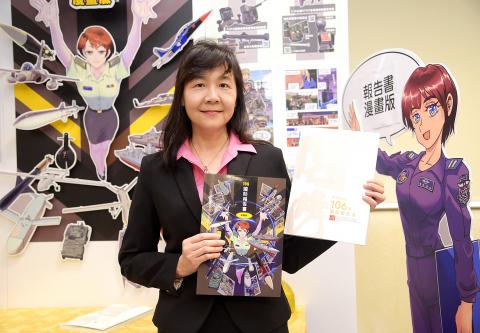The Ministry of National Defense yesterday unveiled its biennial white paper on national defense, outlining doctrinal changes that emphasize asymmetric warfare and layered defense.
The 2017 National Defense Report reiterates the military’s commitment to an all-volunteer force and the indigenous development of military aircraft and warships.
“We are cognizant that our nation cannot compare with the defense budget and military development in China, whose military’s pace of growth and strength have far exceeded expectations,” Minister of National Defense Feng Shih-kuan (馮世寬) said in the report.

Photo: Huang Yao-cheng, Taipei Times
“Consequently, we must employ vision and foresight in our adjustment of defense concepts and overall armament development,” he said.
China has acquired the ability to execute long-range sea and air operations, and it is pushing the reach of its force projection to the areas west of the second island chain, the report said.
The second island chain refers to Japan’s Bonin Islands and Volcano Islands, and the US’ Mariana Islands.
Those developments necessitate a change in the nation’s strategy from “strong defense and effective deterrence” — which had been in effect since 2009 — to “strong defense and layered deterrence,” the report said.
Strong defense refers to in-depth defense, improving combat sustainability, protecting command and control infrastructure from cyberthreats, and developing strategic endurance, it said.
Layered deterrence involves using “innovative and asymmetrical warfare” that confronts the enemy with multiple dilemmas to achieve deterrence, it said.
The overall military strategy in a defensive war is to achieve “force preservation, win decisive battles in littoral waters and annihilate the enemy on the beachhead,” the report said.
It is desirable for the military to acquire precision-guided munitions, electronic countermeasures, guided anti-tank missiles, man-portable air defense systems, fast multiple-role warships, uncrewed aerial vehicles and naval minelaying capabilities, among others, the report said.
The report listed Chinese air and sea drills conducted between Aug. 18 last year and Dec. 11, including 23 air patrols and two aircraft carrier exercises in proximity to Taiwan’s territorial waters or air defense identification zone.
The ministry will stop giving news briefings on ongoing Chinese military exercises near Taiwan, ministry spokesman Major General Chen Chung-chi (陳中吉) told a news conference in Taipei.
“When Chinese aircraft and ships are not posing any more threat to us than usual, we see no need to help them with their propaganda,” he said.

SECURITY: As China is ‘reshaping’ Hong Kong’s population, Taiwan must raise the eligibility threshold for applications from Hong Kongers, Chiu Chui-cheng said When Hong Kong and Macau citizens apply for residency in Taiwan, it would be under a new category that includes a “national security observation period,” Mainland Affairs Council (MAC) Minister Chiu Chui-cheng (邱垂正) said yesterday. President William Lai (賴清德) on March 13 announced 17 strategies to counter China’s aggression toward Taiwan, including incorporating national security considerations into the review process for residency applications from Hong Kong and Macau citizens. The situation in Hong Kong is constantly changing, Chiu said to media yesterday on the sidelines of the Taipei Technology Run hosted by the Taipei Neihu Technology Park Development Association. With

CARROT AND STICK: While unrelenting in its military threats, China attracted nearly 40,000 Taiwanese to over 400 business events last year Nearly 40,000 Taiwanese last year joined industry events in China, such as conferences and trade fairs, supported by the Chinese government, a study showed yesterday, as Beijing ramps up a charm offensive toward Taipei alongside military pressure. China has long taken a carrot-and-stick approach to Taiwan, threatening it with the prospect of military action while reaching out to those it believes are amenable to Beijing’s point of view. Taiwanese security officials are wary of what they see as Beijing’s influence campaigns to sway public opinion after Taipei and Beijing gradually resumed travel links halted by the COVID-19 pandemic, but the scale of

A US Marine Corps regiment equipped with Naval Strike Missiles (NSM) is set to participate in the upcoming Balikatan 25 exercise in the Luzon Strait, marking the system’s first-ever deployment in the Philippines. US and Philippine officials have separately confirmed that the Navy Marine Expeditionary Ship Interdiction System (NMESIS) — the mobile launch platform for the Naval Strike Missile — would take part in the joint exercise. The missiles are being deployed to “a strategic first island chain chokepoint” in the waters between Taiwan proper and the Philippines, US-based Naval News reported. “The Luzon Strait and Bashi Channel represent a critical access

Pope Francis is be laid to rest on Saturday after lying in state for three days in St Peter’s Basilica, where the faithful are expected to flock to pay their respects to history’s first Latin American pontiff. The cardinals met yesterday in the Vatican’s synod hall to chart the next steps before a conclave begins to choose Francis’ successor, as condolences poured in from around the world. According to current norms, the conclave must begin between May 5 and 10. The cardinals set the funeral for Saturday at 10am in St Peter’s Square, to be celebrated by the dean of the College